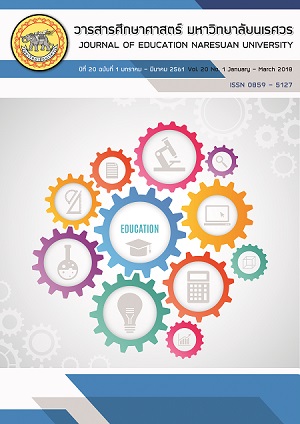การพัฒนารูปแบบเครือข่ายการมีส่วนร่วมระหว่างบ้านและโรงเรียนในถิ่นทุรกันดารบนพื้นที่สูง; DEVELOPMENT OF A MODEL OF PARTICIPATORY NETWORK BETWEEN HOMES AND SCHOOLS IN THE REMOTE SCHOOLS ON HIGHLAND
Main Article Content
Abstract
การวิจัยครั้งนี้มีวัตถุประสงค์เพื่อพัฒนารูปแบบเครือข่ายการมีส่วนร่วมระหว่างบ้านและโรงเรียนในถิ่นทุรกันดารบนพื้นที่สูง มีขั้นตอนการวิจัย 3 ขั้นตอน คือ 1) ศึกษาองค์ประกอบรูปแบบเครือข่ายการมีส่วนร่วมระหว่างบ้านและโรงเรียนในถิ่นทุรกันดารบนพื้นที่สูง ใช้วิธีสังเคราะห์เอกสาร สัมภาษณ์ผู้เชี่ยวชาญจำนวน 6 คน และศึกษาโรงเรียนในถิ่นทุรกันดารบนพื้นที่สูงที่มีวิธีการปฏิบัติที่เป็นเลิศ (Best Practice) จำนวน 3 โรงเรียน 2) สร้างและตรวจสอบรูปแบบเครือข่ายการมีส่วนร่วมระหว่างบ้านและโรงเรียนในถิ่นทุรกันดารบนพื้นที่สูง โดยนำผลการศึกษาจากขั้นที่ 1 มายกร่างแล้วตรวจความเหมาะสมโดยการประชุมระดมความคิดของผู้ทรงคุณวุฒิ จำนวน 9 คน 3) การประเมินผลรูปแบบเครือข่ายการมีส่วนร่วมระหว่างบ้านและโรงเรียนในถิ่นทุรกันดารบนพื้นที่สูง โดยการประชุมผู้บริหารสถานศึกษาในถิ่นทุรกันดารบนพื้นที่สูง จำนวน 116 คน ผลการวิจัย พบว่า รูปแบบเครือข่ายการมีส่วนร่วมระหว่างบ้านและโรงเรียนในถิ่นทุรกันดารบนพื้นที่สูง มีองค์ประกอบ 4 องค์ประกอบ ได้แก่ 1) เป้าหมายของเครือข่าย มี 2 ระดับ คือ ระดับโรงเรียนและระดับชุมชน 2) หลักการของเครือข่ายมี 2 หลักการสำคัญ คือ หลักคิดและหลักปฏิบัติ 3) กลไกของเครือข่าย มี 2 กลไกหลัก คือ กลไกภายในโรงเรียนและกลไกภายนอกโรงเรียน 4) วิธีการดำเนินการของเครือข่าย มี 6 วิธีการ คือ การจัดกลุ่มเครือข่ายร่วมร่วมพัฒนา การถ่ายทอดแลกเปลี่ยนเรียนรู้ การจัดกิจกรรมของเครือข่าย การติดต่อสื่อสาร
การทำงานแทนโรงเรียนโดยชุมชนและการติดตามผลงาน ส่วนผลการประเมินรูปแบบเครือข่ายการมีส่วนร่วมระหว่างบ้านและโรงเรียนในถิ่นทุรกันดารบนพื้นที่สูง พบว่า รูปแบบเครือข่ายการมีส่วนร่วมที่นำเสนอ มีความเป็นประโยชน์และความเป็นไปได้ในการนำไปใช้อยู่ในระดับสูง
DEVELOPMENT OF A MODEL OF PARTICIPATORY NETWORK BETWEEN HOMES AND SCHOOLS IN THE REMOTE SCHOOLS ON HIGHLAND
This research aimed to develop a model of participatory network between homes and schools in the remote schools on highlands. The research procedure followed 3 steps; 1) studying the component and the guideline of a model for participatory network between homes and schools in the remote schools on highlands by using documentary analysis and to interview 6 experts including observation of 3 best practices schools in the remote schools on highlands, 2) constructing a drafted model for participatory network between homes and schools in the remote schools on highlands by using the collected data from step 1 and to validate the drafted model by the focus group discussion of 9 educational experts, and 3) assessing the constructed model by public hearing of 116 schools administrators in the remote schools on highlands. The research findings revealed the following results: there were 4 essential components of the model for participatory network between homes and schools in in the remote schools on highlands namely; 1) the goal of the network consisting of the schools level and the community level, 2) the principles of the network consisted of the concept principle and the practice principle, 3) the mechanism of the network consisting of internal school and external school mechanism, and 4) the procedure of the network consisting of 6 steps namely, grouping of the participatory network, sharing and learning together, the network activities, the network communication the community representative for school affaires and performance following. As for the assessment of the public hearing seminar, the utility and feasibility of the participatory network model were both at the high level.
Article Details
The owner of the article does not copy or violate any of its copyright. If any copyright infringement occurs or prosecution, in any case, the Editorial Board is not involved in all the rights to the owner of the article to be performed.
References
Comer, P. C., & Haynes, M. N. (1991). Parent Involvement in School. An Ecological Approach Elementary School Journal, 91(3), 425-432.
Her Royal Highness Princess Maha Chakri Sirindhorn’s Personal Affairs Division. (2008). Royal initiated plan for developing children in wilderness area of her royal highness princess Maha Chakri Sirindhorn, No. 4 B.E. 2550-2559. Bangkok: Her Royal Highness Princess Maha Chakri Sirindhorn’s Personal Affairs Division. (in Thai)
Khwanmun, P., Chanbanchong, C., Pakdeewong, P., & Kornpuang, A. (2013). The development of the model for public service activity management in schools under the primary education service areas on Thailand – Myanmar Border. Journal of Education Naresuan University, 15(special), 124-135. (in Thai)
Office of the Basic Education Commission. (2009). Developing education in wilderness and mountainous area. Bangkok: Office of the Basic Education Commission. (in Thai)
Prapaipet, S. (2008). Conditions leading to the effective administration in the hill tribe school (Doctoral dissertation). Khon Kaen: Khon Kaen University. (in Thai)

